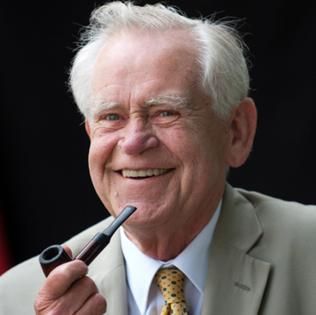1978
Our President in 1978/9 was:
Magnus Magnusson
He proposed the Toast to Sir Walter at our 71st Annual Dinner on Friday 2nd March 1979 in The North British Hotel
Download the [transcript] or read the [bulletin]
Summary of the Speech:
Magnus Magnusson delivered a rich and witty speech exploring the literary and cultural connections between Sir Walter Scott and Iceland. He used his unique position as an Icelander who had adopted Scotland as his home to offer fresh insights into Scott’s enduring impact—both in Scotland and abroad.
Key Points:
- Scott’s Influence on Icelandic Literature:
- Scott never visited Iceland, but Magnusson argued he was metaphorically "into Iceland" more deeply than many who had physically travelled there.
- Scott was heavily influenced by Old Norse and Icelandic sagas, especially the Eyrbyggja Saga, which he translated and adapted.
- His interest in the North began early—in his teenage years—and persisted throughout his life, shaping works like The Pirate and Harold the Dauntless.
- Books and Research:
- Magnusson cited the 55 volumes on Northern life in Scott’s Abbotsford library and Scott’s early essay On the Manners and Customs of the Northern Nations.
- He highlighted Scott’s reading of Thomas Bartholin’s Antiquitatum Danicarum and Olaus Magnus’s History of the Northern Peoples, which satisfied Scott’s fascination with “spookery” and heroism.
- Scott was an omnivorous scholar, albeit sometimes prone to translating Latin versions while pretending to cite from the original Icelandic.
- Scott’s Legacy in Iceland:
- Only two of Scott’s novels had been translated into Icelandic by 1979: Ivanhoe (in 1909, nearly a century after publication) and The Talisman.
- Ivanhoe was initially serialised in a Reykjavík journal with minimal editing, translated literally as Ivar hlújárn (“hoe-iron”).
- Magnusson lamented Iceland’s slow publishing response, calling it “energetic procrastination,” but excused it by noting Iceland’s historical reliance on Danish.
- Scott’s Impact on Jón Thoroddsen:
- Thoroddsen (1818–1868) is considered the first Icelandic novelist and was deeply influenced by Scott.
- His novels Piltur og Stúlka (Lad and Lass) and Maður og Kona (A Man and a Woman) were country tales filled with local dialects and richly drawn secondary characters—mirroring Scott’s style.
- Magnusson explored parallels between their lives: legal careers, love disappointments, circuit travels, poetic beginnings, and literary ambitions.
- Literary Technique and Thematic Affinities:
- Both authors used real-life figures as character models, inserted documentary-style narration, and had a strong sense of moral justice and rural life.
- Thoroddsen, like Scott, featured flawed but unforgettable supporting characters such as sly pastors, comic fools, and petty officials.
- Closing Thoughts:
- Magnusson concluded by reflecting on Scott’s humility—especially his refusal of the Poet Laureateship—and the poetic justice of Scott’s influence eventually leading to Iceland’s Nobel laureate, Halldór Laxness, in 1955.
- He ended with lines from Harold the Dauntless to signal the end of his toast.
Interesting Highlights:
- Magnusson’s theme of “Scott in Iceland” is novel and poetic, metaphorically extending Scott’s influence to a land he never physically visited.
- The Icelandic translation of Scott’s “Breathes there the man…” was both humorous and moving, showing the shared patriotism of the two nations.
- The speech is rich in literary allusion, playfulness, and personal humility—demonstrating Magnusson’s charm as a broadcaster and scholar.
Download the [transcript] or read the [bulletin]

Subsidiary Toasts
After the toast to The Queen had been honoured, the Chairman proposed "The City of Edinburgh", to which Councillor Ralph Brereton, Chairman of the Planning and Development Committee of the City of Edinburgh District Council, replied.
The toast of "Her Majesty's Forces" was proposed by Mr John Telfer Dunbar, and the reply was made by Air Vice-Marshall T.L. Kennedy, C.B., A.F.C., R.A.F., the Air Officer, Scotland and Northern Ireland.
The toast of “The Chairman” was proposed by Mr. W.M. Walker, Q.C.


